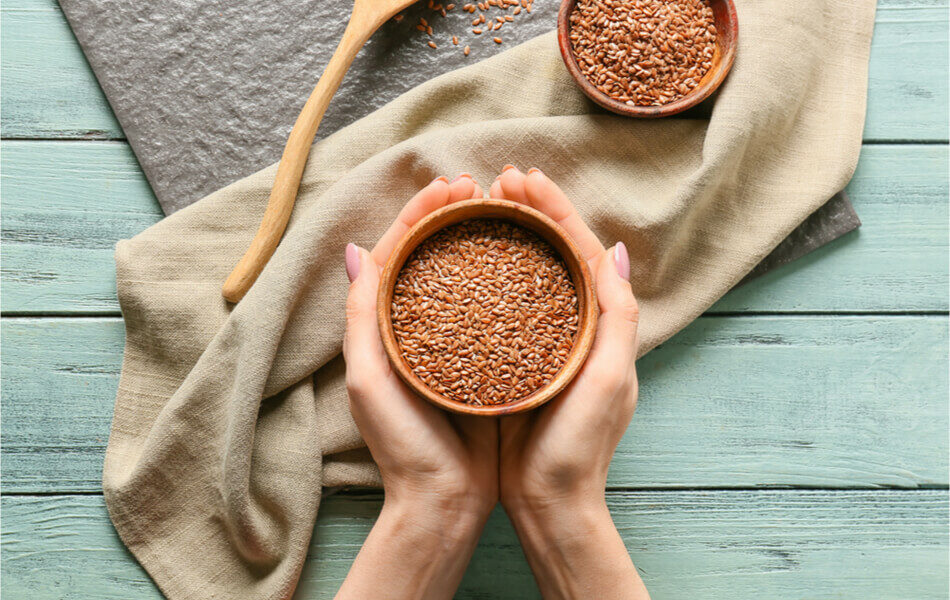How to Eat Flax Seeds for Weight Loss: Actionable Tips
Flax seeds are rapidly increasing in popularity due to their numerous health benefits. This article will discuss what flax seeds are, their health benefits, and how to use them well for weight loss.

Flax seeds are among the most versatile nutrient-packed seeds we have. It is easy to place them in oatmeal bowls and smoothies. They continue growing in popularity as people become more health-conscious.
Flax seeds are also known as linseed. They are grown for their seeds which are ground to make flaxseed meal or pressed for oil. Some people also believe that adding flax seeds to your diet can kickstart your weight loss journey.
If losing weight is a major concern to you, adding flax seeds to your diet can help you shed excess weight. This article will discuss how to eat flax seeds for weight loss, health benefits, and drawbacks.
How to Eat Flax Seeds for Weight Loss
There are various ways to eat flax seeds to lose weight. However, people react differently to flaxseed supplements, and the weight loss rate may vary among individuals.
Flax seeds alone do not help people lose weight without following an exercise routine and a healthy diet plan.
Below are the best ways of using flax seeds to lose weight.
Flaxseed – What Is It?
Flaxseed is a prized superfood rich in dietary fiber, flax oil, and omega-3 fatty acids. Due to its high nutrient profile, it has gained tremendous popularity as part of a healthy weight loss routine.
Flaxseed has tiny brown seeds and is majorly grown in Europe and Asia. There are also yellow flax seeds, which are equally nutritious as brown ones. They are a common addition to the health food industry and can help boost physical and mental health.
What Is Flaxseed Good for?
Flaxseed is commonly used to improve digestive health by chronic diarrhea and constipation. Other benefits of flaxseed are its high fiber and lignan content which helps lower bad cholesterol levels.
The seeds are also a great source of essential fatty acids such as omega-3 fatty acids (alpha-linolenic acid) and omega-6 fatty acids (linoleic acid), which reduce the risk of heart disease.
Flax seeds are known for helping people lose belly fat, thanks to the high fiber content that suppresses appetite and lowers your food intake. Consuming flax seeds helps stabilize blood sugar levels and ensures you shed the extra kilos.
They also have other essential minerals such as copper, molybdenum, ferulic acid, and cyanogenic glycosides.
A systematic review and meta-analysis of a randomized group showed that people who eat flax seeds lose 2.2 pounds compared to those who do not.
#1 Grind the seeds
Ground flax seeds are easier to digest than whole seeds because the intestines cannot efficiently digest the outer shell. Grinding the flax seeds also releases active oils, which the body quickly absorbs.
You can grind whole flaxseed using a coffee grinder and make your weight loss drink by adding one cup of hot water and some lemon juice for taste. You can add ground flaxseed to your smoothies, baked goods, or breakfast cereals.
Always store your ground flaxseed in an airtight container in the freezer to prevent the seeds from turning rancid.
#2 Sprout the seeds
You can also grow flax seeds at room temperature and expose them to indirect sunlight. They will sprout in 24 hours and shoot small green leaves in 5 to 14 days. However, you can let them grow as long as you want, depending on your preferences.
You can then use the sprouts in your salads and sandwiches. The shoots are a good source of minerals such as calcium and magnesium, antioxidants, and vitamins A, B, C, and E.
#3 Use flaxseed oil
Flax seeds are also ground and pressed to release their natural oils. Flaxseed oil has a variety of uses, from cooking to skincare. The oil helps reduce blood pressure, reduce inflammation, lower cholesterol levels, and improve heart health.
Taking a tablespoon of flaxseed oil improves your digestive health, thus facilitating the smooth outflow of toxins and wastes. This prevents constipation and bloating and helps in weight loss.
You can also use it in your salad dressings, sauces, and dips. Another way to add it into your diet is by adding one tablespoon to your shakes and smoothies. Some people also apply it to the skin or use it as a hair mask to promote growth and shine.
Unlike other oils, it’s important to note that flaxseed oil is not suitable for cooking, as it doesn’t have a high smoke point and releases harmful compounds when heated.
#4 Take it as a supplement
You can take flaxseed as a dietary supplement in capsules or tablets to complement the weight loss process. Flaxseed dietary supplements contain flaxseed oil and less fiber than raw flax seeds.
Take these supplements with a glass of water, and follow the instructions on the labeling. You can purchase flaxseed dietary fiber supplements in health food stores. Do not take more than required, and talk to your healthcare provider for advice before using these supplements.
FAQ
Yes, flax seeds are good for you as they have anti-inflammatory properties and are rich in fiber and antioxidants. However, do not consume unripe or raw flax seeds as they have toxic side effects. Flax seeds are also not suitable for pregnant and breastfeeding women.
After taking just one tablespoon a day, people experience the health benefits of consuming flax seeds. However, it is advisable to limit your intake to 4 to 5 tablespoons to avoid having too much fiber in your body.
Flax seeds work best when consumed on an empty stomach. Therefore, it is best to consume it in the morning to kickstart your weight loss journey in the morning.
A Word From Our Nutritionist
Losing excess body weight can be an uphill task, especially for people with no time for workouts. Incorporating flax seeds into your diet can significantly help weight management as they provide essential nutrients to the body and strengthen the immune system.
When taking flax seeds, it is best to consume them by soaking or sprouting to not interfere with mineral absorption.
Flax seeds also contain some antinutrients and could pose adverse health effects for people with health conditions, pregnant and breastfeeding women, or people taking medication.
Including flax seeds as part of a regular diet may have some health benefits, but they are not miracle workers. It would help if you combined them with a workout routine and a proper diet for weight loss.
Consult with your nutritionist for professional advice before making changes to your diet.
Conclusion
More research studies show that flax seeds aid in weight loss due to their antioxidant and anti-inflammatory effects. They are a rich source of fatty acids, plant-based protein, and fiber, responsible for most health benefits.
Regular consumption of flax seeds is associated with many benefits, such as helping in controlling blood pressure and improving skin health. These tiny seeds are versatile, delicious, and a great addition to your daily diet.

















































 Select your language:
Select your language: 








